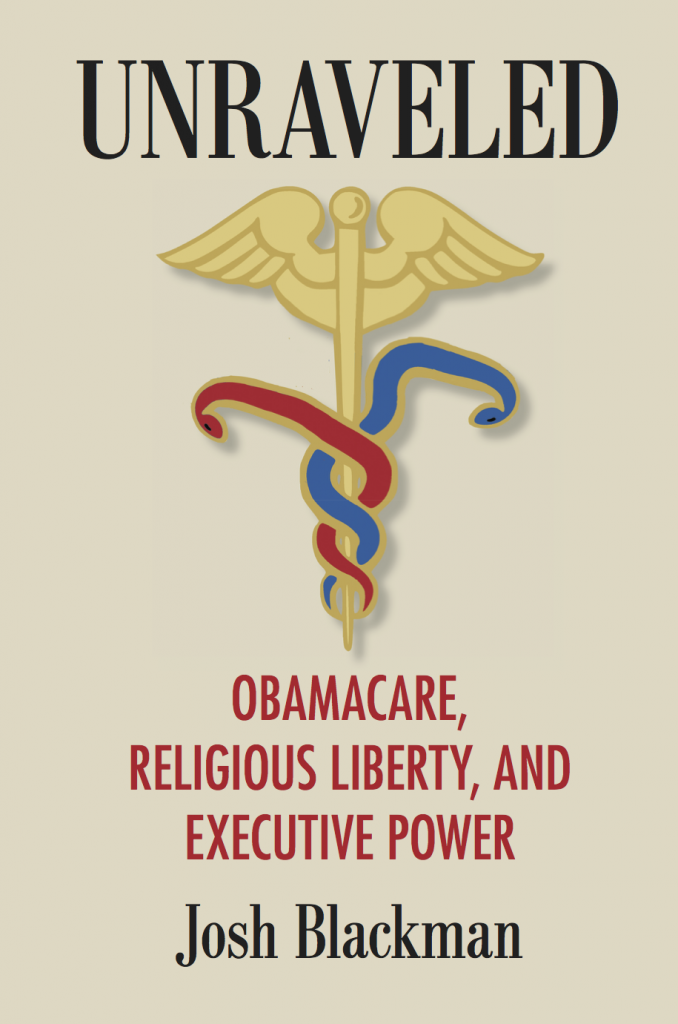On November 4, my co-counsel and I filed a petition for rehearing en banc before the 5th Circuit in Defense Distributed v. Department of State. You can download the brief here. Here is the statement of the case:
Never before has a federal appellate court declined to enjoin a content-based prior restraint on speech while refusing to consider the merits of a First Amendment challenge. Plaintiffs-Appellants, Defense Distributed and Second Amendment Foundation, Inc., respectfully request en banc rehearing. The panel majority’s novel decision contradicts a long line of established Supreme Court and circuit precedents governing constitutional claims and injunctive relief—including decisions of this and all other regional federal circuit courts of appeal. To read the opinion is to establish the necessity of en banc review, which is essential to maintain decisional uniformity and to consider questions of exceptional importance.
1. Courts adjudicating motions to enjoin unconstitutional actions must weigh the familiar preliminary injunction standards set out in Winter v. Natural Res. Def. Council, Inc., 555 U.S. 7, 20 (2008): the plaintiff’s likelihood of success on the merits, irreparable harm, balance of the equities, and the public interest. Courts are required to consider the first prong, Sole v. Wyner, 551 U.S. 74, 84 (2007); Ashcroft v. ACLU, 542 U.S. 656, 666 (2004), which “is arguably the most important.” Tesfamichael v. Gonzales, 411 F.3d 169, 176 (5th Cir. 2005); cf. Laclede Gas Co. v. St. Charles County, 713 F.3d 413, 419-20 (8th Cir. 2013).
If a court refuses to consider a plaintiff’s likelihood of success on the merits, it perforce cannot fully assess irreparable harm, nor can it balance the equities. Nor can a court that ignores the merits of a constitutional case comprehend (let alone determine) the public interest, which by definition cannot contradict the Constitution itself.
Accordingly, ten circuits stress the primacy of Winter’s first prong in the First Amendment context. See Sindicato Puertorriqueño de Trabajadores v. Fortuño, 699 F.3d 1, 10-11 (1st Cir. 2012); N.Y. Progress & Prot. PAC v. Walsh, 733 F.3d 483, 488 (2d Cir. 2013); Stilp v. Contino, 613 F.3d 405, 409 (3d Cir. 2010); WV Ass’n of Club Owners & Fraternal Servs. v. Musgrave, 553 F.3d 292, 298 (4th Cir. 2009); Liberty Coins, LLC v. Goodman, 748 F.3d 682, 690 (6th Cir. 2014); ACLU of Illinois v. Alvarez, 679 F.3d 583, 589-90 (7th Cir. 2012); Child Evangelism Fellowship of Minn. v. Minneapolis Special Sch. Dist. No. 1, 690 F.3d 996, 1004 (8th Cir. 2012); Verlo v. Martinez, 820 F.3d 1113, 1126 (10th Cir. 2016); Scott v. Roberts, 612 F.3d 1279, 1297 (11th Cir. 2010); Pursuing America’s Greatness v. FEC, 831 F.3d 500, 511 (D.C. Cir. 2016). Another circuit views the merits prong as potentially decisive in the First Amendment context. Dish Network Corp. v. FCC, 653 F.3d 771, 776 (9th Cir. 2011).
The majority’s decision, affirming the denial of a preliminary injunction against a censorial prior restraint without regard to the merits, conflicts with Winter, Sole, Ashcroft, and Tesfamichel, which mandate a merits analysis; and with the above-cited decisions of all other regional circuits holding the merits prong indispensable or potentially dispositive in First Amendment cases.
2. The majority’s remarkable holding that the Government may serve the public interest by violating the Constitution conflicts with Jackson Women’s Health Org. v. Currier, 760 F.3d 448 (5th Cir. 2014); Opulent Life Church v. City of Holly Springs Miss., 697 F.3d 279 (5th Cir. 2012); Ingebretsen ex rel. Ingebretsen v. Jackson Pub. Sch. Dist., 88 F.3d 274 (5th Cir. 1996); Liberty Coins, supra, 748 F.3d 682; Awad v. Ziriax, 670 F.3d 1111 (10th Cir. 2012); and Pursuing America’s Greatness, supra, 831 F.3d 500, among other opinions.
The majority’s unbalanced analysis has the effect of placing the Court in the Government’s censorial position. Suppose that Saudi Arabia refused the United States essential military cooperation, so long as Saudi citizens could access Americans’ online files related to the 3D printing of the devices secured in Reliable Consultants v. Earle, 517 F.3d 738 (5th Cir. 2008). Would “national security” justify the State Department in ordering Americans to take down their web sites?
Americans reading the panel opinion may wonder whether the content of their speech determines whether this Court would hear the merits of their First Amendment claims. The majority’s merits-free, First Amendment-free approach must apply to everyone, or to no one.
If the Court is unprepared to do away with preliminary injunctions to secure the right of free speech, it should conform its decisional law to the Supreme Court’s requirements and adopt the standards applied in the other circuits. Rehearing en banc should be granted.
